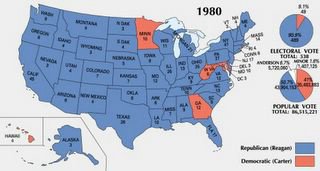Senator Shelby sure knows how to
bring home the bacon.
Here are some of the eyebrow-raising expenditures that Senator Shelby has managed to include in the 2006 Commerce, Justice and Science Appropriations Bill:
$1 million to let state prisoners talk with their attorneys at the Jefferson County Criminal Justice Center by videoconference.
Ever heard of Yahoo Messenger? It's free.
$850,000 for the Alabama Department of Archives and History.
Preserving our history is a very good thing, but if Alabama and other states don't start paying for stuff like this out of their own tax revenues, one thing's for certain - the federal budget deficit won't be a relic of history anytime soon.
$275,000 for the Huntsville-Madison County Botanical Garden.
Because money grows on trees, you know.
$3.5 million for Auburn University to develop high efficiency, free piston stirling converters.
You know, I've always wanted one of those...but I'd prefer mine to be built by the private sector.
$150,000 for the University of Alabama Cultural Development Program. The money will help expand the Zelpha-Wells music education programs for economically disadvantaged children.
LA LA LA LA. I'M NOT LISTENING.
$8 million for the continuing revitalization of downtown Tuscaloosa. The funding will go towards design, planning, and land acquisition.
$500,000 to help the city of Montgomery in revitalizing the riverwalk area of downtown.
Can you tell that Senator Shelby is from Tuscaloosa?
$5 million for planning, design and construction of a new science facility at Alabama State University.
$30 million for a state-of-the-art science and engineering complex at the University of Alabama.
Again, it's easy to tell that Senator Shelby is from Tuscaloosa. By the way,
didn't they just build a state-of-the-art science and engineering facility at the University of Alabama? And didn't the federal government provide $30 million for it? And wasn't it named after Richard Shelby? And in honor of his profligate spending, didn't it come in at almost $20 million over cost?
$1 million for Gulf Shrimp Bycatch and Reduction Research to protect and maintain the red snapper fishery.
$1 million to research new, innovative ways to grow and strengthen the Gulf oyster industry.
$2.3 million for the Southern Shrimp Industry Alliance to conduct research, collect data and provide analyses to determine and document shrimp industry fishing efforts in the Gulf of Mexico and the South Atlantic.
$5 million for the Southern Shrimp Industry Alliance’s marketing campaign to conduct research and develop new products and improve quality assurance of domestic wild shrimp from several southern states including Alabama.
$6 million to establish a Center for Aquatic Resource Management at Auburn University.
$500,000 for Auburn University to develop an inland shrimp and saltwater fish industry in the Black Belt. The funds will be used to assist farmers with the necessary information to grow and market shrimp and other fish profitably using existing water sources in the Black Belt.
...because Alabamians love a good fishing story.
$350,000 for the Regional Center for Community and Economic Development at the University of West Alabama to provide an avenue for economic development and job growth throughout West Alabama and the Black Belt.
$500,000 for the Center for International Business and Economic Development at Troy University to enhance economic development in the wiregrass.
Can you say "duplication?" The already-existing and adequately-funded
Center for Business and Economic Research at the University of Alabama "works to promote economic development through economic and demographic research for public and private sector organizations." Likewise with the
Economic Development Institute at Auburn University. It was "created in 1988 and has established itself as one of Alabama's leading organizations for economic development education and professional development, research, and community assistance."
$ 1 million to the University of South Alabama for youth violence prevention research.
$950,000 to the West Alabama Youth Violence Initiative at the University of Alabama. The funds will to conduct a number of studies on youth violence intended to provide a better understanding of the programs and methods of prevention that are most effective.
For $2 million, you can buy several truckloads of canned whoopass.
$300,000 to the City of Orange Beach for an after school teen activity program.
Dude, they live on a friggin' BEACH.
$1 million for Mobile's Bring Back Broad Street initiative.
How about an initiative to bring back fiscal sanity?
$1 million for the Alabama Nature Center Interactive immersive-reality science laboratory, providing students with the opportunity to access large public domain databases such as the data from the Hubbell Space Telescope.
Look
here...it's free. Ahhh...the wonders of the internet age.
$300,000 to help with development of a light industrial mall in the City of Oneonta.
Industries build things and make money. Cities tax things and take money. They should get together sometime.
$1 million for the Gulf Coast Exploreum Science Center.
Let's see here. They charge admission. They have various levels of membership. They host birthday parties and camps. They rent out their (quite impressive) facilities. And, they have a gift shop. Sounds like they can pay their own way in the world. If not, I'm sure the City of Mobile would be eager to help out.
$100,000 for construction and equipping of a county animal shelter in Randolph County.
That reminds me...we should enact a leash law to restrain our free-spending Congresspersons.
$250,000 for the Alabama Writers Hall of Honor and conference center in Monroeville.
Wonder if they'll reserve a wall for bloggers?
(Primary sources for the above information are here, here, here, here, here, and here.)





